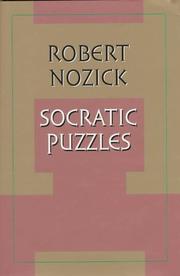Check nearby libraries
Buy this book

Comprising essays and philosophical fictions, classics and new work, the book ranges from Socrates to W. V. Quine, from the implications of an Israeli kibbutz to the flawed arguments of Ayn Rand. Nozick considers the figure of Socrates himself as well as the Socratic method (why is it a method of getting at the truth?). Many of these essays bring classic methods to bear on new questions about choice.
How should you choose in a disconcerning situation ("Newcomb's Problem") when your decisions are completely predictable? Why do threats and not offers typically coerce our choices? How do we make moral judgments when we realize that our moral principles have exceptions? Other essays present new approaches to familiar intellectual puzzles, from the stress on simplicity in scientific hypotheses to the tendency of intellectuals to oppose capitalism.
Check nearby libraries
Buy this book

People
SocratesTimes
PhilosophyShowing 1 featured edition. View all 1 editions?
| Edition | Availability |
|---|---|
| 1 |
aaaa
Libraries near you:
WorldCat
|
Book Details
Edition Notes
Includes bibliographical references (p. [333]-390) and index.
Classifications
The Physical Object
ID Numbers
Source records
amazon.com recordBetter World Books record
Library of Congress MARC record
marc_columbia MARC record
Work Description
One of the foremost philosophers of our time, Robert Nozick continues the Socratic tradition of investigation. This volume, which illustrates the originality, force, and scope of his work, also displays Nozick's trademark blending of extraordinary analytical rigor with intellectual playfulness. As such, Socratic Puzzles testifies to the great pleasure that both doing and reading philosophy can be.
Comprising essays and philosophical fictions, classics and new work, the book ranges from Socrates to W. V. Quine, from the implications of an Israeli kibbutz to the flawed arguments of Ayn Rand. Nozick considers the figure of Socrates himself as well as the Socratic method (why is it a "method" of getting at the truth?). Many of these essays bring classic methods to bear on new questions about choice. How should you choose in a disconcerting situation ("Newcomb's Problem") when your decisions are completely predictable? Why do threats and not offers typically coerce our choices? How do we make moral judgments when we realize that our moral principles have exceptions? Other essays present new approaches to familiar intellectual puzzles, from the stress on simplicity in scientific hypotheses to the tendency of intellectuals to oppose capitalism.
As up to date as the latest reflections on animal rights; as perennial as the essentials of aesthetic merit (doggerel by Isaac Newton goes to prove that changing our view of the world won't suffice); as whimsical as a look at how some philosophical problems might appear from God's point of view: these essays attest to the timeliness and timelessness of Nozick's thinking. With a personal introduction, in which Nozick discusses the origins, tools, and themes of his work, Socratic Puzzles demonstrates how philosophy can constitute a way of life.
Community Reviews (0)
Feedback?History
- Created April 1, 2008
- 10 revisions
Wikipedia citation
×CloseCopy and paste this code into your Wikipedia page. Need help?
| August 6, 2024 | Edited by MARC Bot | import existing book |
| September 17, 2022 | Edited by ImportBot | import existing book |
| November 23, 2020 | Edited by MARC Bot | import existing book |
| August 23, 2020 | Edited by ImportBot | import existing book |
| April 1, 2008 | Created by an anonymous user | Imported from Scriblio MARC record |











